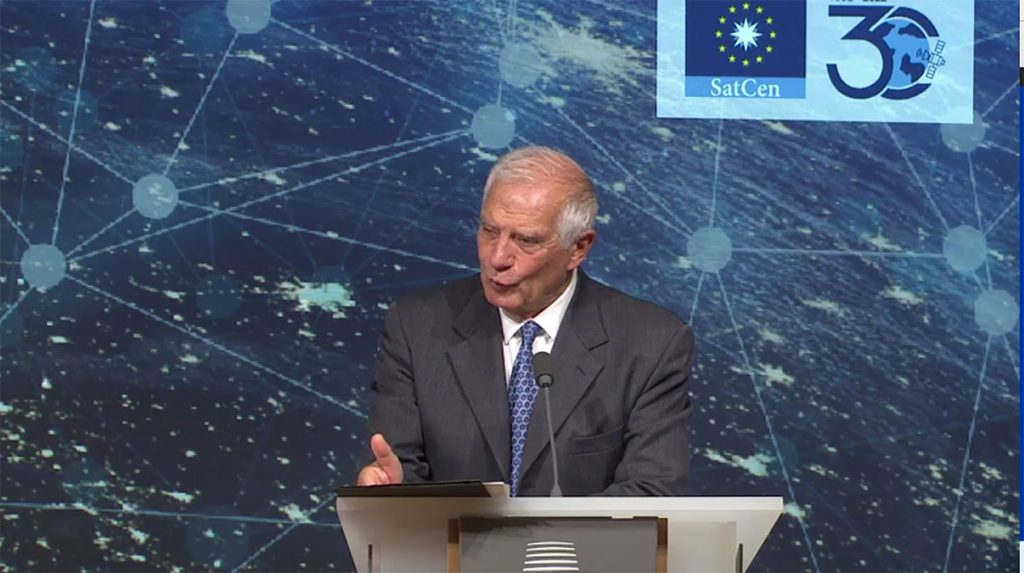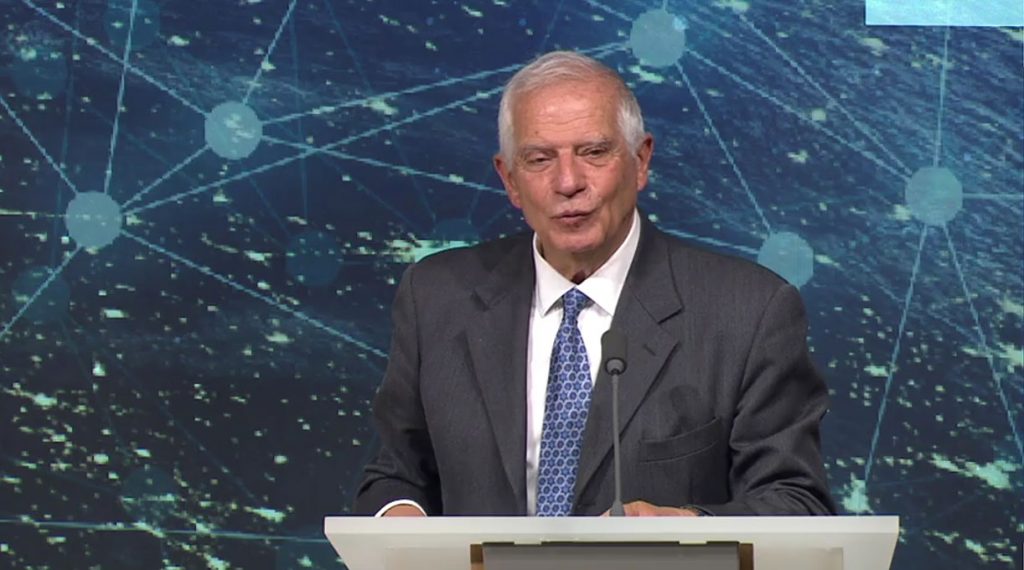The images that you are managing – are our eyes. You are the eyes of Europe. Through the information that you are providing, we get to see and know better what is going on in the world.
To celebrate the 30 years of SatCen many celebrations have been initiated, including an exhibition in Brussels, titled “SatCen and Security from Space: 30 years serving a European Security Endeavour”. The SatCen supports the decision making and actions of the European Union in the field of Common Foreign and Security Policy (CFSP), in particular Common Security and Defence Policy (CSDP), including European Union crisis management missions and operations, by providing products and services resulting from the exploitation of relevant space assets and collateral data, including satellite imagery and aerial imagery, and related services. (EEAS)
European Satellite Centre: Opening speech by High Representative Josep Borrell at the exhibition marking its 30th anniversary (Check against delivery!) — Source — EEAS — November 7, 2022 —
Well, thank you. I am flying back from the [United Arab] Emirates, I did not want to miss this opportunity so [I am] happy to meet with all of you and to participate in this anniversary of our [European] Satellite Center.
[Some] weeks ago, we were in Madrid at the Headquarters [for] the inauguration of the new building for our Satellite Centre in this turning of age. I thought it was an important anniversary that should be celebrated also here in Brussels. Because maybe people in Brussels do not know exactly what we are doing in Torrejón [de Ardoz, Spain].

In Madrid, I stressed the importance of the Satellite Center for our decision-making process, and everybody involved in the decision-making process has to be aware of what the Center is doing for us. I said it in Madrid, and I want to repeat it here: our satellites – the satellites that you are managing, the images that you are managing – are our eyes. You are the eyes of Europe. Through the information that you are providing, we get to see and know better what is going on in the world.
Every day, when building the foreign policy, we deal with complex situations. Some places are far away and often information is hard to come by. Yes, you have pictures, you have statistics, but nothing replaces the “on the spot”, real time vision. Many times, before deciding, we need to assess what is going on. That is why we rely on you, on our Satellite Center.
Today’s event, that I was pushing for [to take] place in Brussels, is an opportunity to highlight the achievements of the past 30 years. And I want these achievements to be known by everybody. It is the occasion to raise awareness about your work and your contributions, and also – maybe more important – to look into the future.
You have heard about the evolution of the Satellite Center. It was established in the early 1990s in a period of many security challenges and instability – maybe, I don’t know, as many as today. Since then, the Satellite Centre was able to make important contributions to our decision-making process, starting for example with the Great Lakes crisis in Africa. Now we have another Great Lakes crisis in Africa – in fact, they have never vanished. But you started working with the big Great Lakes crisis in Africa and with the conflicts in the former Yugoslavia.
Ten years later, in 2002, the Satellite Centre became a European Union Agency. And since then, it has remained [until] today the European Union’s geospatial intelligence agency, providing autonomous intelligence analysis for our institutions and for our Member States, and supporting our foreign and security policy.
Your work is crucial for our missions, for our civilian and military missions and operations. SatCen is providing critical information, critical input for the work of our naval Operation IRINI in the Mediterranean, monitoring violations of the arms embargo in Libya; or for our [EU Monitoring] Mission in Georgia; or for our [Operation EU NAVFOR] Atalanta at the Somalian coast. I recently visited the Atalanta [Operation] on-board of a Spanish ship, and they recognised that their mission was possible thanks to, among other things, the images that they get from you.
You support our diplomatic efforts, for example in the South Caucasus: the negotiations between Armenia and Azerbaijan, that had been facilitated by President [of the European Council, Charles] Michel, relied directly on your geospatial analysis.
You contribute also to the recognition by international organisations that benefit from our work – for instance the United Nations, the Organisation for Security and Cooperation in Europe (OSCE), and the Organisation for the Prohibition of Chemical Weapons (OPCW).
They benefit from us, from you – from us, because I am chairing the board – because we offer a unique capability to support our partners, and to do it in a timely mannerFor instance, another example is what is happening in Moldova and Ukraine. And it is very important. In the context of this [Russian] aggression against Ukraine, you are demonstrating your strategic role and the relevance of this model. [When] other space and information services and agencies can no longer operate in such conflicts, then SatCen becomes crucial.
Not only that, Frontex also benefits from our information for border management, or with the [European] Union’s Space programme, Copernicus, an important component of the Union Earth observation, that also benefits from the Satellite Centre’s top level geospatial intelligence expertise. The European Space industry. That is a lot.
This [30th] Anniversary is a good moment to make a balance of the past work but, for me, it is more important the opportunity to reflect about the future of our Satellite Center. We should place this future in the context of our increasing level of ambition in the field of security, defence and space, in light of the unprecedented level of threats that the Union is facing.
I want to stress that because we are certainly facing an unprecedented level of threats. An increasing level of ambition in the field of Security, Defence and Space has to be our answer to these threats.
We started doing that with the Strategic Compass. We adopted this in March [2022] and there, it mentions specifically the Satellite Centre. We call, in the Strategic Compass, for the strengthening of its capacity by 2025. We call for a new Space Strategy at the service of the security and defence of the Europeans. In doing that, we are working together, how not, with Commissioner [for Internal Market, Thierry] Breton.

This new strategy will be looking both at, first, “security in space”, meaning how to protect our space infrastructure and respond at the European Union level when we are confronted with space threats in space. And second, “security from space”, meaning how space contributes to our security and defence – there, certainly, you have an important role to play.
Your contribution to our security and defence is highly relevant politically. And that is why I intend to keep this issue high on our agenda and continue to hold the [European] Satellite Centre Board meetings at Ministerial level.
We were talking about strategic culture – this is an important dimension. I am convinced that a stronger Satellite Centre will contribute also to building of a common strategic culture in the European Union and to leverage the European Union as a strategic actor and as a global security provider. I want to stress these three words: global security provider, with our own autonomous geospatial intelligence capacity.
President [of the European Commission, Ursula] von der Leyen was asking for that also in the last State of the Union address. Yes, we have to have our own geospatial intelligence capacity, if we really want to be a global security provider.
Ladies and gentlemen,
It is fitting that we mark this important anniversary with a special exhibition that showcases the evolution of the Satellite Center over the last three decades. There, we will have so many examples of our work displayed in the Justus Lipsius [Council] building until 18 November.
It would be good, also, that this exhibit goes out of the walls of the European Union’s institutions. It would be good if we could find the ways and the places where ordinary people, citizens, can have a look at it without having to come to the European Union’s buildings.
I think that they have to understand how we are monitoring diverse situations and crises: monitoring the migration activity, the assessment of the damage caused by the explosion in Beirut in 2020, or the environmental monitoring after the tsunami in Chile in 2010. Every time that there is something important happening in the world – in our neighbourhood and beyond – the eyes of the Satellite Center have been there watching, explaining, informing and supporting decision-making processes.
These pictures are so impressive that I think people will be very interested in looking at them.
These are examples of the unique added value of the Centre to the life of the European Union.
So, I want to commend you, Sorin [Ducaru, Director of SatCen], and all Satellite Centre staff – all of you – for your invaluable work, and your future achievements to help guarantee the safety, the security and the well-being of European citizens.
Let’s take these exhibits everywhere we can. There are many places in Europe where we can show to the ordinary citizens, normal people, which are the eyes of Europe, and how through the eyes of Europe, we are following what is happening in the world, to increase their security and to improve our policies.
So, thank you very much to all of you and now, we will enjoy this exhibition.
Link to the video: https://audiovisual.ec.europa.eu/en/video/I-232845










